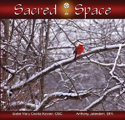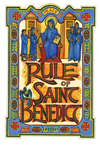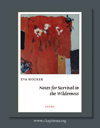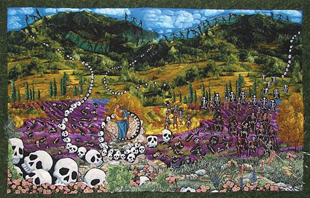The writing life of sisters, brothers, and priests

Francis de Sales, patron saint of writers, said that “it is love that gives value to our works.” Love is what draws us to our chosen craft and serves as the catalyst for the creative process. For sisters, brothers, and priests who choose to write, love is also what sustains them in their vocation to God and the writing life. This year’s VISION spotlight showcases men and women religious artists whose chosen medium is words—in the form of poetry, essays, reflections, biographies, and other genres.
SISTER MARVA HOECKELMAN, O.S.B. of the Benedictine Sisters of Mother of God Monastery in Watertown, South Dakota has been writing since she was 11 years old and has been published in numerous places, including the National Catholic Reporter. She is very grateful to her prioress and her community for the support they give her in regard to her writing.
 THE POEMS IN HER RECENT BOOK Sacred Space, says Sister Mary Keyser, O.S.C., a contemplative Secular Franciscan, grew out of her experience of daily life at her monastery.
THE POEMS IN HER RECENT BOOK Sacred Space, says Sister Mary Keyser, O.S.C., a contemplative Secular Franciscan, grew out of her experience of daily life at her monastery.
BENEDICTINE SISTER MARY E. PENROSE, O.S.B. of St. Scholastica Monastery in Duluth, Minnesota writes reflections for her community and blogs regularly.
 The Benedictine Quest: Seeking God
The Benedictine Quest: Seeking God
The end of all prayer is union with God. Throughout history, groups have pursued this end in different ways. Eventually, these ways came to be characteristic enough to label them “traditions.” Seeking God in the life of Benedictines is one of them. . . .
Our ancestors who lived in the ancient world experienced a basic rhythm of work and rest in their lives, and they felt kinship with the universe and its habits. They worked and rested with the seasons and according to the tempo of the day. Today, when we are less in touch with mother earth and the cycles of nature, it is good news to know that the Rule of St. Benedict respects this basic rhythm.
"ABOUT FIVE YEARS AGO,” says Franciscan Sister Helene Mertes, O.S.F. “when a medical crisis occurred, I took a three-month sabbatical and discovered I could write poetry. I believe it is a gift from God.”
The Violet Patch
 HOLY CROSS SISTER EVA MARY HOOKER, C.S.C. is professor of English and writer-in-residence at Saint Mary’s College in Notre Dame, Indiana. Her new sequence of poems, Notes for Survival in the Wilderness, is a hand-bound chapbook from Chapiteau Press.
HOLY CROSS SISTER EVA MARY HOOKER, C.S.C. is professor of English and writer-in-residence at Saint Mary’s College in Notre Dame, Indiana. Her new sequence of poems, Notes for Survival in the Wilderness, is a hand-bound chapbook from Chapiteau Press.
DIVINE WORD FATHER DAVID R. MAYER, S.V.D. taught American literature and language at Nanzan University, founded by the Divine Word Missionaries in Nagoya, Japan. “For me,” says Mayer, “writing is a way of consolidating and focusing on the grandeurs and diversity of God’s creation. As a Trappist monk told me: ‘That’s contemplation.’ ”
Komagane Poems contains short essays, haiku-like verses, and drawings about insects.
Black Swallowtail
IN ADDITION TO HER “very Benedictine” study and preservation of primetime television programming, primarily the 1950s, Sister Judine Mayerle, O.S.B. of St. Scholastica Monastery in Duluth, Minnesota has finished the final draft of a mystery, The Blue Horse, set in a Benedictine monastery.
The Quiet Journey of Lent
(originally published in the National Catholic Reporter)
Lent comes on quiet feet, slipping into Ordinary Time while we are still breathless from barefoot running with the shepherds to the brilliance of the star. Lent comes on quiet feet, leading us to paradox and parables, barren desert and living water. We walk through Lent with the Lord on quiet feet until we run ahead with palm branches and song, sit with Him at supper in the upper room, protest His washing of our feet. We walk through Jerusalem on weary feet, to the garden to watch and pray with Him, to the praetorium to weep for Him, to the cross to die with Him.
And to the tomb, to rise with Him!
"I'VE ALWAYS LOVED WORDS,” says Sister Elizabeth Wagner of Transfiguration Hermitage in Windsor, Maine, “and some years ago, in a discussion with my spiritual director, came to realize that perhaps I have a call, not only to contemplative life, but to writing.”
Bare Bones
My cell is where I sit in solitude, morning after morning, evening after evening, for prayer, meditation, and lectio. Here I sit, here where I can just be, and be still, in the presence of the One who loves me beyond all others. Here is the space of encounter with this presence, this gracious empty space whose structure is four walls, a floor, a ceiling, a few simple pieces of furniture—but whose horizon is infinity. This space encompasses eternity in the here and now of daily life. . . .
 Daily life at its most basic, stripped to its bare bones, consists of two movements. One is combative, polarizing, stretching us in seemingly opposite directions at the same moment. The other is peace-filled, integrating, grounding. I never know which way any particular day will go.
Daily life at its most basic, stripped to its bare bones, consists of two movements. One is combative, polarizing, stretching us in seemingly opposite directions at the same moment. The other is peace-filled, integrating, grounding. I never know which way any particular day will go.
The challenge in solitude, as in every life, is to retain that horizon of infinite spaciousness, when mind and heart, and even the events of daily life, conspire to convince me that my only horizon is the confines of my self. This is the battle that all of us wage. In the cloister however, we are rarely distracted from it, and so it looms enormously large. Slowly learning our own weaknesses and disabilities, our own particular proneness to negativity of whatever sort, we spend a lifetime learning how to counteract ourselves. . . .
SEVERAL YEARS of freelancing in prose and poetry and four months at writers’ residencies led to graduate school for Franciscan Sister Rafael Tilton, O.S.F., where she completed her thesis on the poet Wallace Stevens’ Resemblances.
BEFORE SISTER SUZANNE ZUERCHER, O.S.B. of St. Scholastica Monastery in Chicago could read or write, her mother was her scribe and copied down the poems and songs Suzanne created, which the preschooler would then illustrate. She has published several books and a collection of poems.
 FATHER ISAAC (JOHN) SLATER, O.C.S.O. currently serves as prior of the Abbey of the Genesee. Along with a first collection of his poems, Surpassing Pleasure, he co-translated with Jeffrey Einboden The Tangled Braid: Ninety-Nine Poems by Hafiz of Shiraz. He has found the silence and compression of Trappist monastic life congenial to poetry.
FATHER ISAAC (JOHN) SLATER, O.C.S.O. currently serves as prior of the Abbey of the Genesee. Along with a first collection of his poems, Surpassing Pleasure, he co-translated with Jeffrey Einboden The Tangled Braid: Ninety-Nine Poems by Hafiz of Shiraz. He has found the silence and compression of Trappist monastic life congenial to poetry.
SISTER LOU ELLA HICKMAN, I.W.B.S., a member of the Sisters of the Incarnate Word and Blessed Sacrament, has had more than 200 of her poems published.
the widow of naim
LIVING IN COMMUNITY and praying with my sisters is what sustains my spirit,” says Sister Susan Marie Lindstrom, O.S.B. of Our Lady of Grace Monastery in Beech Grove, Indiana. “It is from that nurtured interior space that I write. I don’t ever recall deciding to be a writer. When ordinary talk failed to capture what was moving within me, soul-felt words would just tumble forth onto blank pages and reveal to me what was germinating in my heart.”
CISTERCIAN FATHER PAUL JEROME KONKLER, O.C.S.O., is a monk-priest at the Abbey of New Clairvaux, in Vina, California. A spiritual director for many years, he lived as a hermit from 1985-2005. He is the author of a number of books including Don’t You Belong to Me? and Death and Its Happy Outcome.
[From]
Death and Its Happy Outcome
To be in Heaven is to be enthralled with everyone there. We will never encounter someone who does not love us and enjoy our company. We ourselves will have been purified of every defect. We will treasure and love everyone we meet. And that will be constant and endless, to the furthest reaches of God’s immense universe. Every moment will be perfect and complete in itself. Life goes on in Heaven from perfect experience to flawless experience. Each event is its best possible, and one after another.
SISTER MARVA HOECKELMAN, O.S.B. of the Benedictine Sisters of Mother of God Monastery in Watertown, South Dakota has been writing since she was 11 years old and has been published in numerous places, including the National Catholic Reporter. She is very grateful to her prioress and her community for the support they give her in regard to her writing.
Rabbit Sits on Rock
Tiny fellow
Soft fur
Young eyes
Trembles yet
Sits still
On rock.
Rose granite
Stone solid
Old man
Wears moss
Sits still
Nose in earth.
 THE POEMS IN HER RECENT BOOK Sacred Space, says Sister Mary Keyser, O.S.C., a contemplative Secular Franciscan, grew out of her experience of daily life at her monastery.
THE POEMS IN HER RECENT BOOK Sacred Space, says Sister Mary Keyser, O.S.C., a contemplative Secular Franciscan, grew out of her experience of daily life at her monastery.Clare, Jesus and Us
(addressed to Saint Clare of Assisi)
Clare, you bid us follow
the royal road of the
cross.
Jesus greets us at each step
and leads us
To even greater depths.
You ask us: “Gaze upon,
consider, and
contemplate”
each phase of Jesus’ life.
It is a wonder that draws us
to new heights.
(addressed to Saint Clare of Assisi)
Clare, you bid us follow
the royal road of the
cross.
Jesus greets us at each step
and leads us
To even greater depths.
You ask us: “Gaze upon,
consider, and
contemplate”
each phase of Jesus’ life.
It is a wonder that draws us
to new heights.
 In 1995 Sister Roseanne Murphy, S.N.D.deN.’s book about the cofoundress of the Sisters of Notre Dame de Namur, Julie Billiart: A Woman of Courage, was published by Paulist Press. It was because of that book that the Sisters of Notre Dame of the Ohio Province asked Sister Roseanne to write a biography of Sister Dorothy Stang, murdered in 2005 because of her work with poor farmers in the jungles of Brazil. Murphy’s Martyr of the Amazon was released by Orbis Press in 2007. In 1995 Sister Roseanne Murphy, S.N.D.deN.’s book about the cofoundress of the Sisters of Notre Dame de Namur, Julie Billiart: A Woman of Courage, was published by Paulist Press. It was because of that book that the Sisters of Notre Dame of the Ohio Province asked Sister Roseanne to write a biography of Sister Dorothy Stang, murdered in 2005 because of her work with poor farmers in the jungles of Brazil. Murphy’s Martyr of the Amazon was released by Orbis Press in 2007. |
BENEDICTINE SISTER MARY E. PENROSE, O.S.B. of St. Scholastica Monastery in Duluth, Minnesota writes reflections for her community and blogs regularly.
 The Benedictine Quest: Seeking God
The Benedictine Quest: Seeking GodThe end of all prayer is union with God. Throughout history, groups have pursued this end in different ways. Eventually, these ways came to be characteristic enough to label them “traditions.” Seeking God in the life of Benedictines is one of them. . . .
Our ancestors who lived in the ancient world experienced a basic rhythm of work and rest in their lives, and they felt kinship with the universe and its habits. They worked and rested with the seasons and according to the tempo of the day. Today, when we are less in touch with mother earth and the cycles of nature, it is good news to know that the Rule of St. Benedict respects this basic rhythm.
"ABOUT FIVE YEARS AGO,” says Franciscan Sister Helene Mertes, O.S.F. “when a medical crisis occurred, I took a three-month sabbatical and discovered I could write poetry. I believe it is a gift from God.”
The Violet Patch
I remember so well the sea of blue
in the sunny space in the woods.
It is my memory’s treasure:
Innocent blue faces with their green feet attached to mother earth
praising Creator, reaching for Son
and feeling the Breeze of Spirit.
Gently they accepted me and I become one with them,
praising, reaching and feeling,
A gift from God
A nudge to earth awareness!
and a memory treasure of thankfulness.
 HOLY CROSS SISTER EVA MARY HOOKER, C.S.C. is professor of English and writer-in-residence at Saint Mary’s College in Notre Dame, Indiana. Her new sequence of poems, Notes for Survival in the Wilderness, is a hand-bound chapbook from Chapiteau Press.
HOLY CROSS SISTER EVA MARY HOOKER, C.S.C. is professor of English and writer-in-residence at Saint Mary’s College in Notre Dame, Indiana. Her new sequence of poems, Notes for Survival in the Wilderness, is a hand-bound chapbook from Chapiteau Press.Direction Finding
When you are facing north, stars will appear
to be moving from your right to your left. Their movement is slow,
but easily seen—
like a subsiding (had I but this)—
Or remedy—
| FATHER DAVID MAYER, S.V.D. at a fish market in Japan |
Komagane Poems contains short essays, haiku-like verses, and drawings about insects.
Black Swallowtail
Streamlined sweeping black
Gingerly alighting, slack,
Lest tailored tail touch.
Bagworms
Homeless, jobless core
Dragging baggy possessions—
Simplification.
| "I SEE POETRY as food for the soul, relaxing therapy for the body, and a unique exercise for the mind,” says Sister Ramona Kruse, O.S.F. Easter Brightness (excerpt) My Easter thoughts were not a joy When prefaced by the Judas deed Until my prayers reflected more And inspired a greater creed. Resurrection thoughts revealed a Brightness greater than the sun Which was dwarfed by ethereal light That manifested God’s Son! |
The Quiet Journey of Lent
(originally published in the National Catholic Reporter)
Lent comes on quiet feet, slipping into Ordinary Time while we are still breathless from barefoot running with the shepherds to the brilliance of the star. Lent comes on quiet feet, leading us to paradox and parables, barren desert and living water. We walk through Lent with the Lord on quiet feet until we run ahead with palm branches and song, sit with Him at supper in the upper room, protest His washing of our feet. We walk through Jerusalem on weary feet, to the garden to watch and pray with Him, to the praetorium to weep for Him, to the cross to die with Him.
And to the tomb, to rise with Him!
"I'VE ALWAYS LOVED WORDS,” says Sister Elizabeth Wagner of Transfiguration Hermitage in Windsor, Maine, “and some years ago, in a discussion with my spiritual director, came to realize that perhaps I have a call, not only to contemplative life, but to writing.”
Bare Bones
My cell is where I sit in solitude, morning after morning, evening after evening, for prayer, meditation, and lectio. Here I sit, here where I can just be, and be still, in the presence of the One who loves me beyond all others. Here is the space of encounter with this presence, this gracious empty space whose structure is four walls, a floor, a ceiling, a few simple pieces of furniture—but whose horizon is infinity. This space encompasses eternity in the here and now of daily life. . . .
 Daily life at its most basic, stripped to its bare bones, consists of two movements. One is combative, polarizing, stretching us in seemingly opposite directions at the same moment. The other is peace-filled, integrating, grounding. I never know which way any particular day will go.
Daily life at its most basic, stripped to its bare bones, consists of two movements. One is combative, polarizing, stretching us in seemingly opposite directions at the same moment. The other is peace-filled, integrating, grounding. I never know which way any particular day will go.The challenge in solitude, as in every life, is to retain that horizon of infinite spaciousness, when mind and heart, and even the events of daily life, conspire to convince me that my only horizon is the confines of my self. This is the battle that all of us wage. In the cloister however, we are rarely distracted from it, and so it looms enormously large. Slowly learning our own weaknesses and disabilities, our own particular proneness to negativity of whatever sort, we spend a lifetime learning how to counteract ourselves. . . .
| Sister Marilyn Brinker, CHM of the Congregation of the Humility of Mary says poetry is her way to pray to God. Her book, A Joy-Filled Journey, is available online. [From] Ocean Gifts Heartfelt thanks, Filled with wonder and awe, Excitement and laughter, Joy and praise of the Creator, Ocean Gifts, are gifts given to me. Ocean gifts. Sing praise. Amen! |
Sorrow Is a Golden Bait
The sun stoops
To gild it; refraction hides
Its imposing line
And spur-hook insides.
Sorrow is a golden bait;
Its cold flame
With melancholy shine
Promises a joy
Like that fullers refine;
Sorrow is a golden bait.
With taut love
The Son of Man will wait.
Sorrow is the golden bait.
BEFORE SISTER SUZANNE ZUERCHER, O.S.B. of St. Scholastica Monastery in Chicago could read or write, her mother was her scribe and copied down the poems and songs Suzanne created, which the preschooler would then illustrate. She has published several books and a collection of poems.

Today
the scripture passage
was about
Ezechiel
who
was in trouble
so he collected a lot of
old bones
with all the meat
picked off
and somehow got them together
into a pretty productive
force.
We sisters liked that story.
 FATHER ISAAC (JOHN) SLATER, O.C.S.O. currently serves as prior of the Abbey of the Genesee. Along with a first collection of his poems, Surpassing Pleasure, he co-translated with Jeffrey Einboden The Tangled Braid: Ninety-Nine Poems by Hafiz of Shiraz. He has found the silence and compression of Trappist monastic life congenial to poetry.
FATHER ISAAC (JOHN) SLATER, O.C.S.O. currently serves as prior of the Abbey of the Genesee. Along with a first collection of his poems, Surpassing Pleasure, he co-translated with Jeffrey Einboden The Tangled Braid: Ninety-Nine Poems by Hafiz of Shiraz. He has found the silence and compression of Trappist monastic life congenial to poetry.[From]
Making Waves
Crossing paths, monks
in the abbey hallways always
nod or signal hi there
and the gesture, a casual yes
to the presence of the other says
leisure says
here in the green world between
eternal fields of light
there is time
there is ample, empty, time
to acknowledge
all that is passing . . . .
SISTER LOU ELLA HICKMAN, I.W.B.S., a member of the Sisters of the Incarnate Word and Blessed Sacrament, has had more than 200 of her poems published.
| Sister Margaret A. Palliser, O.P., a Dominican Sister of Sparkill, New York, is currently senior editor of Living with Christ. “As a Dominican,” she says, “I am embracing the order’s charism of preaching every time I use words to spread the good news of God’s love and mercy as revealed in Jesus.” The parable of the old electric fan  When I was a young sister, my father surprised me with an unannounced visit. He wanted to bring me a gift, but with eight younger children still at home he had no extra money to buy something for me. So he spent almost 24 hours on buses from our family home in St. Louis to our motherhouse in Sparkill, New York, all the while carrying by hand his black Emerson Electric desk fan—you know, the kind that oscillates from side to side at different speeds. Dad insisted that I keep his fan to help me deal with the summer heat. That 22-lb. fan is now more than 60 years old, and, as they say, they don’t make them like that anymore! It is still working—smoothly and silently (unlike modern-day models!). But the fan of my parable is more than a vintage appliance. It symbolizes the depths of my father’s selflessness and thoughtfulness—the treasure of a father’s love that will always remain with me, even when the day comes that the fan no longer functions. This month we will hear many of Jesus’ parables. Perhaps we might be so bold as to discover and celebrate parables of God’s love that abound in our own stories. Is there a parable you can share with others? The kingdom of God is like an old electric fan . . . .” When I was a young sister, my father surprised me with an unannounced visit. He wanted to bring me a gift, but with eight younger children still at home he had no extra money to buy something for me. So he spent almost 24 hours on buses from our family home in St. Louis to our motherhouse in Sparkill, New York, all the while carrying by hand his black Emerson Electric desk fan—you know, the kind that oscillates from side to side at different speeds. Dad insisted that I keep his fan to help me deal with the summer heat. That 22-lb. fan is now more than 60 years old, and, as they say, they don’t make them like that anymore! It is still working—smoothly and silently (unlike modern-day models!). But the fan of my parable is more than a vintage appliance. It symbolizes the depths of my father’s selflessness and thoughtfulness—the treasure of a father’s love that will always remain with me, even when the day comes that the fan no longer functions. This month we will hear many of Jesus’ parables. Perhaps we might be so bold as to discover and celebrate parables of God’s love that abound in our own stories. Is there a parable you can share with others? The kingdom of God is like an old electric fan . . . .” |
the widow of naim
what in the world were you
thinking
Yeshua, when you told a widow, of all people, don’t cry?
(as if you didn’t know your people made grieving an art)
still, you pitied this woman wrapped in widow’s weeds
what will become of me—I am all alone
out of this pity, a touch . . .
a son given back . . .
her sorrow became the parable
you would teach in Your dying and rising
LIVING IN COMMUNITY and praying with my sisters is what sustains my spirit,” says Sister Susan Marie Lindstrom, O.S.B. of Our Lady of Grace Monastery in Beech Grove, Indiana. “It is from that nurtured interior space that I write. I don’t ever recall deciding to be a writer. When ordinary talk failed to capture what was moving within me, soul-felt words would just tumble forth onto blank pages and reveal to me what was germinating in my heart.”
Stepping Out
A new part of the journey is upon me, God,
a new path begins to unfold . . .
and I, restless wanderer that I am,
am at once anxious to take new steps
and hesitant to travel the unknown.
I long for the days
when I will look back and glimpse the footprints I have made.
For now, however,
I ask the grace to live today
and see tomorrow
through Your eyes . . .
full of hope, promise, and possibility.
Grant me a persevering heart,
unbounded courage
and gentleness in the transition.
Be with me on this journey, Lord.
CISTERCIAN FATHER PAUL JEROME KONKLER, O.C.S.O., is a monk-priest at the Abbey of New Clairvaux, in Vina, California. A spiritual director for many years, he lived as a hermit from 1985-2005. He is the author of a number of books including Don’t You Belong to Me? and Death and Its Happy Outcome.
[From]
Death and Its Happy Outcome
To be in Heaven is to be enthralled with everyone there. We will never encounter someone who does not love us and enjoy our company. We ourselves will have been purified of every defect. We will treasure and love everyone we meet. And that will be constant and endless, to the furthest reaches of God’s immense universe. Every moment will be perfect and complete in itself. Life goes on in Heaven from perfect experience to flawless experience. Each event is its best possible, and one after another.
Tags
Related
- Religious communities have deep and diverse roots
- Scientific wonder is God’s handiwork
- Respite and renewal brought to you by religious communities
- Lives that lead to God: Biographies and memoirs
- Religious orders aid and advocate for migrants
- Rural religious take to the highways and byways
- Divine design: The holiness of place
- More prayer spaces of religious communities
- Word as witness to the Word
- More poems by religious Read More
Most Viewed
- Find your spirituality type quiz
- FAQs: Frequently asked questions about vocations
- Celibacy quiz: Can you live a celibate life?
- Resources for older discerners or those with physical and developmental differences
- About Vocation Network and VISION Guide


